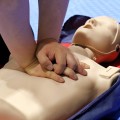CPR or Cardiopulmonary Resuscitation is a technique for saving lives that is useful in several emergencies, like when someone has drowned or has had a heart attack, especially when his/ her heartbeat has ceased. It can be learned through the CPR course NC.
As per the American Heart Association (AHA), CPR must be started with quick and hard chest compressions. This hands-on technique is advised for both trained responders as well as untrained bystanders. Even if one does not have the confidence to do CPR, doing something is better than nothing and makes for the difference between life and death.
CPR can keep blood rich in oxygen flow to the brain and other organs till medical intervention can restore heart function. Note that the heart’s stoppage and blood flow can cause much damage within a few minutes.
CPR in North Carolina (NC)
There are plenty of sources for top-quality certification programs and CPR classes in NC. Many offer convenient online classes combined with practicum. Though generally, people perceive CPR as a technique relevant for educators, medical professionals, and providers of child-care, the AHA recommends that all become certified, including babysitters, children, parents, etc. The more persons trained in CPR; the more lives will be saved every year.
NC programs certified by AHA
Before one signs up for a CPR training program, go in for one certified by the AHA. The AHA certification is the platinum standard for best practices in CPR. Its guidelines are followed even by the Red Cross.
Selecting CPR programs in NC
Though anyone can take any kind of CPR course, it is wise to choose the best one as per one’s needs. For instance, the basic Heart Saver course is for everyone, but medical professionals need to take up more targeted training.
Following are the main programs:
Heart saver CPR for infants, children, and adults
In case one is a total novice to CPR and doesn’t work in the medical profession, this is the right place to start. One will learn how to identify a basic cardiac episode, conduct an evaluation and deliver rescue breathing and chest compressions for the infant, child, and adult population.
Heart saver CPR and first aid
This comprises of basic Heart Saver course mixed with First Aid techniques. It caters to the regular people needing heart saver CPR but is also in much demand for employers who desire customers and clients to have better confidence in their employees. Those likely to attend such courses include employees of health clubs, lifeguards, providers of childcare (at corporate offices, gyms, schools), group leaders, coaches, nannies, and safety managers of companies.
BLS for health care providers
The BLS (Basic Life Saving) certification was designed for those working in the medical field dealing with more vulnerable persons in the arena. Apart from CPR skills, the BLS deals with more complicated scenarios. It includes real-life simulations and cooperative problem-solving.
This course is in demand for Nurses, Physicians, Physical therapists, Police officers, fire fighters, correctional officers, and anyone working in a healthcare setting.
ACLS for medical personnel
Like BLS, ACLS (Advanced Cardiac Life Support) classes are meant for medical personnel. Mostly it is used by persons who have to deal with cardio-pulmonary events or emergencies. It does involve course instruction but has a focus on cooperative work that helps in an effective intervention during a heart-related medical event.
This course is sought most by nurses, physicians, fire fighters, paramedics, and medical personnel working in ICUs and ER’s.
PALS for children
Pediatric Advanced Life Support (PALS) focuses on cardiac events more common in pediatric population. Courses led by instructors are delivered in video and group formats with simulations that stress team dynamics and positive communication.
In sum, these are the main facts about CPR course NC.

